Coordinación
Una coordinación sólida puede evitar vacíos y duplicaciones en las respuestas humanitarias, así como garantizar que los PTM complementen otros tipos de asistencia. Sin embargo, el informe del «Estado Global de los Programas de Transferencias Monetarias» de la CALP Network muestra que la coordinación de la asistencia en efectivo es vista como débil y ad hoc, y que esto está teniendo graves repercusiones operativas.
Los donantes, las ONG y los líderes de los grupos de trabajo de transferencias monetarias (GTM) han pedido claridad sobre tres temas principales relacionados con la coordinación de la asistencia en efectivo:
- Quién debe ser responsable de asegurar una coordinación eficaz de la asistencia en efectivo;
- Cuál es la función y el mandato de los grupos de trabajo de transferencias monetarias, incluso en relación con las transferencias monetarias multipropósito;
- Cómo se debe dotar de recursos a la coordinación de asistencia en efectivo.
Tenemos que basarnos urgentemente en lo que funciona y proporcionar claridad a nivel mundial sobre las preguntas arriba mencionadas, adaptándonos a los diferentes contextos. Hace mucho tiempo que se deberían haber tomado decisiones claras basadas en necesidades operativas y no en la política de las agencias.
Prioridades actuales
El objetivo de la CALP Network es contribuir a seguir progresando en este tema en tres niveles: apoyar a los grupos de trabajo de transferencias monetarias a nivel regional; contribuir a soluciones prácticas para la coordinación de la asistencia en efectivo a nivel mundial; y convocar una discusión basada en la evidencia sobre temas clave, destacando puntos de decisión críticos y oportunidades de progreso.
Contenido destacado

Cash Coordination Tip Sheet
Guidelines and Tools
This tip sheet sets out established best practice, key guidance and resources for all aspects of cash coordination, intended as a clear, accessible and action-oriented guide for those engaged in coordination of cash and voucher assistance (CVA) at the field level.

Introducing the Cash Coordination Tip Sheet
Webinar
The CALP Network has developed a tipsheet setting out established best practice and key guidance and resources for all aspects of cash coordination, intended as a clear, accessible and action-oriented guide for those engaged in coordination of cash and voucher assistance at the field level.

Cash Coordination: A proposal from members in MENA
Blog Post
Earlier this year the CALP Network undertook regional consultations to explore options for cash coordination. This blog lays out recommendations from participants from the Middle East and North Africa who sketched out what cash coordination, and coordination more broadly, could look like in future to support a more effective, efficient and accountable response.
Últimos recursos
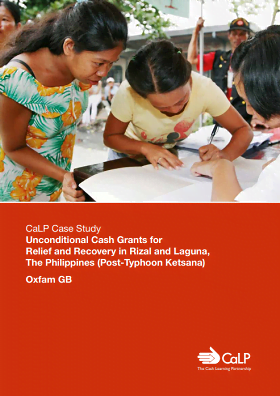
Unconditional Cash Grants for Relief and Recovery in Rizal and Laguna, The Philippines (Post-Typhoon Ketsana)
Report
In response to rapid onset flooding in Laguna and Rizal provinces in the Philippines, Oxfam International implemented a Cash Transfer Programme (CTP) in three phases: 1) Unconditional cash transfers for individuals to provide for basic needs; 2) Conditional cash transfers for individuals resuming income...

ICT/mobile Phone Technology: A shift in the right direction
Blog Post
Thirteen African nations came together for the AgriKnowledge Share Fair in Addis Ababa at the end of October 2012 to learn about approaches for quicker and more efficient humanitarian response. Government representatives, researchers, UN agencies and NGOs gathered for a three day symposium on best...
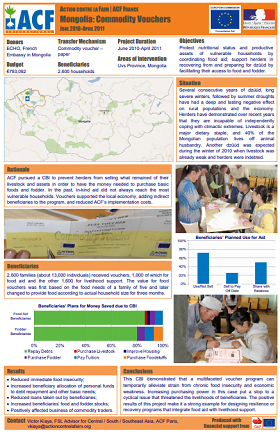
ACF Mongolia Commodity Vouchers (Poster)
Report
This one-page poster provides an overview of ACF’s commodity voucher programme in Mongolia.
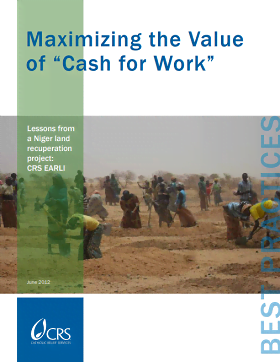
Maximizing the Value of "Cash for Work": Lessons from a Niger land recuperation project
Report
The good practices in this publication were distilled from a Real Time Evaluation (RTE) of an emergency project in Niger, implemented by Catholic Relief Services (CRS) and financed by OFDA that is using cash for work and seed fairs to address food insecurity in the departments of Ouallam and...
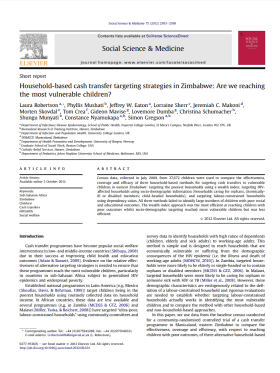
Household-Based Cash Transfer Targeting Strategies in Zimbabwe: Are we reaching the most vulnerable children?
Report
Census data, collected in July 2009, from 27,672 children were used to compare the effectiveness, coverage and efficacy of three household-based methods for targeting cash transfers to vulnerable children in eastern Zimbabwe: targeting the poorest households using a wealth index; targeting HIV affected...
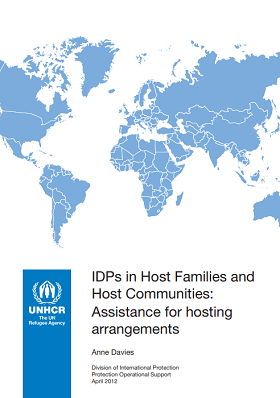
IDPs in Host Families and Host Communities: Assistance for Hosting Arrangements
Report
The phenomenon of internally displaced persons (IDPs) and refugees residing with host families is still relatively unexplored in comparison to what is known about IDPs and refugees living in camps. Of the nearly 14.7 million IDPs protected and assisted by UNHCR in 2010, an estimated 52% of the total live...
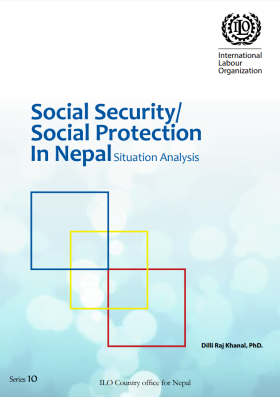
Social Security/Social Protection In Nepal: Situation analysis
Report
The International Labour Conference has outlined several strategies to extend social security by closing coverage gaps and pointed out that effective national strategies should be formed in line with national priorities, administrative feasibility and affordability. The primary goal is to ensure that no...

Cash transfer programming in urban emergencies: a toolkit for practitioners
Guidelines and Tools
In recognition of the increasing urban populations around the world and their increasing vulnerability to disasters, the the CALP Network endeavored to investigate the current status and impact of urban emergency response programs that utilise cash transfer programming. This study aims to better...
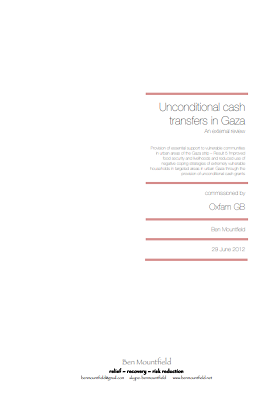
Unconditional cash transfers in Gaza: an external review
Report
This is a review of small pilot project, which targets extremely vulnerable households with monthly unconditional cash transfers for a limited period. The target population is made up of two groups, one group already receiving assistance through a voucher from WFP but still showing poor food diversity...

Cash Transfers in Nairobi’s Slums
Report
In Kenya, a combination of factors led to the food crisis of 2008–9, which put around 9.5 million people at risk of starvation. About 4.1 million of those affected were living in informal settlements (slums) in the capital, Nairobi. Oxfam and Concern Worldwide developed a joint programme to address...
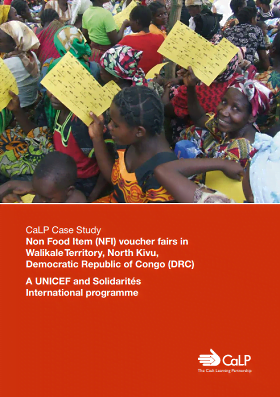
Non Food Item (NFI) Voucher Fairs in Walikale Territory, North Kivu, DRC (the CALP Network Case Study)
Case Study
In response to a rapid-onset emergency, UNICEF and Solidarités International utilized a cash-based voucher approach in Nyasi and Bobolo villages, in Walikale Territory, North Kivu, Democratic Republic of Congo (DRC). As part of a larger multi-province, multi-partner response programme in DRC known as...
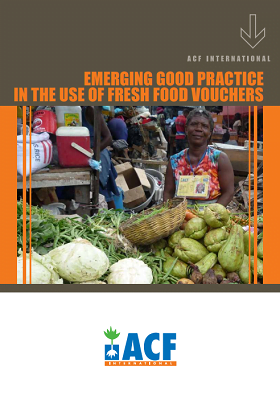
Emerging Good Practice in the use of Fresh Food Vouchers
Report
The purpose of this Good Practice Review is to provide practitioners with information on emerging good practice in the use of Fresh Food Vouchers (FFV), as well as practical examples from the field. In the Introduction, the GPR reiterates the nature of a fresh food voucher and explains some advantages and...

Final Evaluation Report of the Wet Feeding and Cash Transfer Project in Southern Somalia
Report
This evaluation report details the achievements of the ECHO funded Wet Feeding and Resource Transfer project implemented by Danish Refugee Council in Mogadishu and ended on March 30th. This synopsis precedes the details of the project and the evaluation as contained in the report. The wet feeding...

Cash Transfer Programming in Urban Emergencies: Tools (Annex 2)
Guidelines and Tools
This file contains the following tools referenced as Annex 2 of the the CALP Network Urban Toolkit:
1. Sample Focus Group Discussion Questionnaire to Establish Urban-Specific Vulnerability Criteria
2. Sample Urban Household Survey
3. Template in PowerPoint of Commodity Market Map
4. Template in PowerPoint...

MPESA Project Analysis: Exploring the use of cash transfers using cell phones in pastoral areas
Report
Safaricom Limited, a mobile network operator in Kenya, launched a mobile money transfer system called M-PESA in 2007. This system allows users to send or receive money on their Safaricom SIM card. Télécoms sans Frontières and Vétérinaires sans Frontières – Germany decided to work in partnership on...

Meta-Evaluation of ACF Fresh Food Voucher Programmes
Report
ACF commissioned a meta-evaluation of five of its fresh food voucher programmes implemented between 2009-2011 during emergencies in Bolivia, Dadaab refugee camps in Kenya, Haiti, Pakistan and the occupied Palestinian Territories (oPT). The programmes were all paper cash vouchers exchanged for fresh foods...

Haiti – Unconditional Cash Transfers: Lessons Learnt
Report
The challenges of responding to the catastrophic earthquake in Haiti were huge and varied, prompting agencies to think and act creatively. Christian Aid’s partners were at the forefront of the humanitarian response, distributing cash to people affected by the disaster two weeks after the earthquake...

An Emergency Market Mapping and Analysis study Changing Responses to the Haiti Earthquake
Report
Good practice standards guidelines and evaluations all emphasise the importance of including markets in emergency situation and response analysis. While this approach has become more widely accepted by international organisations in recent years, in practice it is clear that support is still needed to...
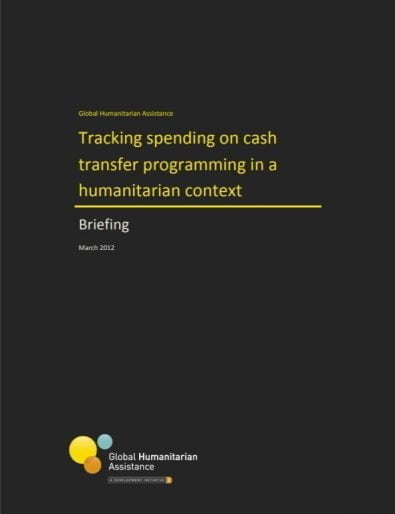
Tracking Spending on Cash Transfer Programming in a Humanitarian Context
Report
This briefing paper provides a brief overview of cash transfers by situating them within official development assistance (ODA) analysis. However, the core of this analysis concentrates on tracking cash transfer programme spending in humanitarian aid. For analysis of cash transfer spending in crisis...

Annex 1: Multi-Sector Market Assessment (MSMA)
Report
The Multi-Sector Market Assessment (MSMA) Annex is designed to help practitioners examine whether an affected target population can fairly and equitably access the expected amount of goods and services in
order to meet the objectives of the Multipurpose Cash Grant (MPG) programme.
The aim of the MSMA is...